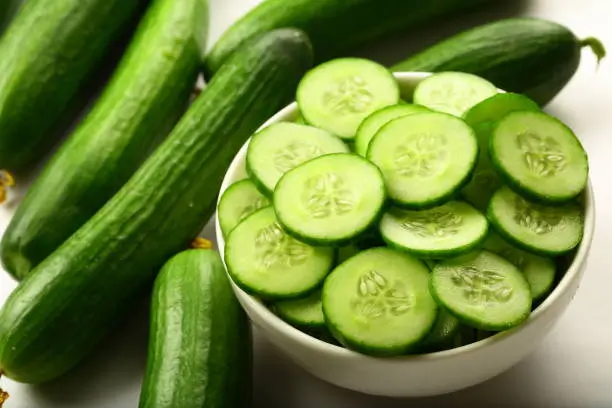Cucumbers, with their refreshing crunch and mild flavor, are a beloved vegetable in many parts of the world. These low-calorie, hydrating greens not only make a delightful addition to salads but also offer a wealth of nutritional benefits.
In this article, we’ll delve into the history, nutritional value, health advantages, and diverse culinary applications of cucumbers.
The History of Cucumbers

Cucumbers, scientifically known as Cucumis sativus, have a rich history that dates back thousands of years. Native to the Indian subcontinent, cucumbers were cultivated in ancient civilizations in India and other regions of Asia.
They eventually spread to Europe, where the ancient Greeks and Romans enjoyed them.
Cucumbers were used for both culinary and medicinal purposes in various ancient cultures.
They were considered cool, refreshing food in hot climates and were also believed to have therapeutic properties. Over the centuries, cucumbers have become a staple in diets around the world.
Nutritional Value
Cucumbers are celebrated not only for their high water content but also for their nutrient-rich profile. They are low in calories and carbohydrates while offering an array of vitamins, minerals, and antioxidants. Here is an overview of their nutritional content:
1. Water:
Cucumbers comprise over 95% water, making them an excellent hydrating food.
2. Vitamins:
They provide vitamins such as vitamin K, vitamin C, and small amounts of vitamin A and various B-complex vitamins.
Vitamin K is essential for blood clotting, vitamin C acts as an antioxidant and supports the immune system, and vitamin A is important for good vision and skin health.
3. Minerals:
Cucumbers contain minerals like potassium, magnesium, and small amounts of calcium and phosphorus. Potassium helps maintain proper heart and muscle function, while magnesium is essential for nerve and muscle function.
4. Fiber:
Cucumbers are a source of dietary fiber, which supports digestion, helps maintain a feeling of fullness, and regulates blood sugar levels.
5. Antioxidants:
Cucumbers offer various antioxidants, such as flavonoids and tannins, which help protect the body from oxidative stress and reduce the risk of chronic diseases.
Health Benefits
1. Hydration:
Cucumber’s high water content makes them an excellent choice for staying hydrated, especially in hot weather.
2. Weight Management:
The low calorie and high water and fiber content in make them a great choice for weight management. They contribute to a feeling of fullness and help control appetite.
3. Skin Health:
are often used topically for skincare, but their consumption can also contribute to skin health. The vitamin C and antioxidants in cucumbers help protect the skin from damage and promote a healthy complexion.
4. Digestive Health:
The fiber aids in digestion and helps maintain regular bowel movements. It can be particularly helpful for individuals looking to alleviate constipation.
5. Heart Health:
Potassium supports heart health by helping to regulate blood pressure.
6. Antioxidants:
provide antioxidants that help reduce the risk of chronic diseases and protect cells from damage caused by free radicals.
Culinary Uses
are known for their versatility in the kitchen and can be used in various culinary applications. Here are some popular ways to enjoy cucumbers:
1. Fresh in Salads:
are a common addition to salads, contributing a cool and refreshing element. They pair well with ingredients like tomatoes, onions, and various greens.
2. Cucumber Slices:
Sliced cucumbers make a healthy and crunchy snack, perfect for dipping in hummus, tzatziki, or your favorite dip.
3. Cucumber Water:
slices can be added to water to infuse it with a mild, refreshing flavor. This is a popular choice for staying hydrated.
4. Pickles:
are frequently used for making pickles, which are preserved in a brine solution. Pickles can be sweet, dill, or spicy, depending on the preparation method.
5. Cucumber Soup:
soup, often served chilled, is a refreshing dish for warm weather. It is typically seasoned with herbs, yogurt, and sometimes garlic.
6. Cucumber Smoothies:
can be blended into smoothies to add a refreshing and hydrating element. They pair well with fruits like melons, strawberries, and citrus.
7. Sandwiches:
slices are a common addition to sandwiches, adding a crisp and cooling texture to the overall taste.